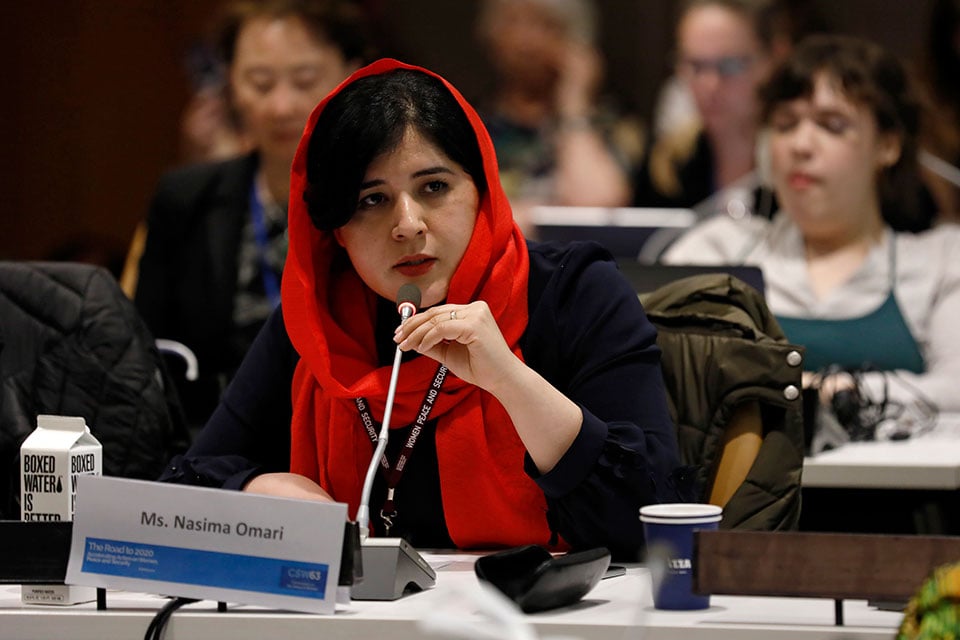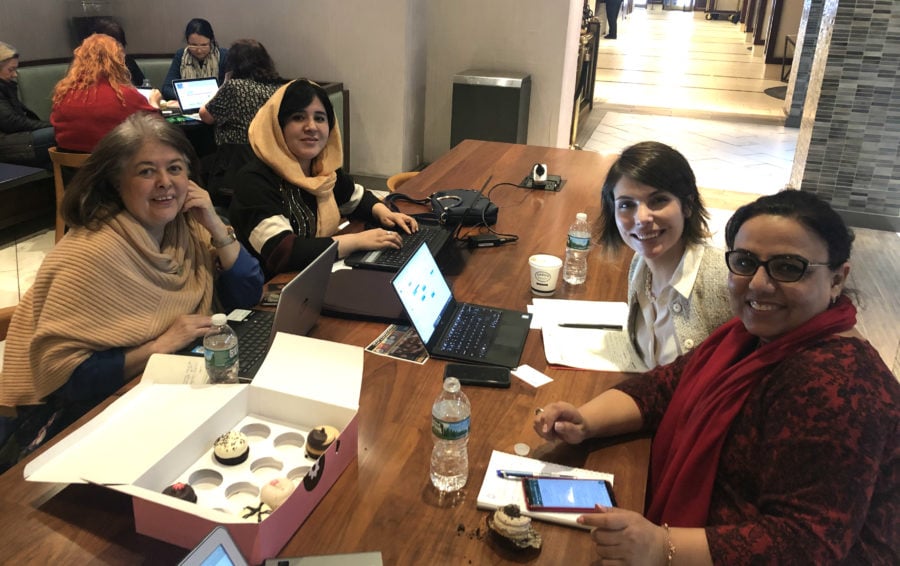While the US-led negotiations with the Taliban in Qatar are ongoing, Cordaid is intensifying its efforts to ensure that Afghan women get a seat at the table. “Without the inclusion of Afghan women real peace is unthinkable,” says Cordaid Gender Expert Anne Kwakkenbos. A US senator and Angelina Jolie are backing AWN and Cordaid’s advocacy efforts.

In March, Mary Akrami, director of the Afghan Women’s Network (AWN) – Cordaid’s longstanding partner in Afghanistan – shared her increasing concern that women’s rights risk being bargained away in the current US-led talks with the Taliban. She stated unreservedly that “no peace deal should come with restrictions on women’s employment, freedom of movement and autonomy. If it did, this would not only curtail women, it would be disastrous to the country as a whole.”
Women’s inclusion: a non-negotiable priority
Later that month, during the Commission on the Status of Women (CSW) in the UN Headquarters in New York, Cordaid and AWN once more highlighted the importance of including independent, politically non-affiliated Afghan women in any peace process. While addressing members of the UN Security Council, Nasima Omari, Cordaid’s Lobby and Advocacy expert in Kabul and Afghan herself, said: “Afghan women have always played an active role in public life. We have continued to contribute to the development of post-Taliban Afghanistan. Despite this, peace deals are taking place outside Afghanistan and we are being ignored.” According to Omari “women’s inclusion must be a non-negotiable priority.”
“The international community should walk the walk by providing such women activists with the funding that is so desperately needed to get them to and from these critical conversations.”
After the meetings in New York, a delegation of AWN and Cordaid travelled to Washington DC to continue their talks with US senators and members of the House of Representatives.
Advocacy for Afghan women’s rights in the US
“We reiterated what many Afghan women say,” Anne Kwakkenbos explains. “Which is that by having exclusive talks with the Taliban about the future of Afghanistan, and simultaneously preparing to withdraw from that country, the US is giving prominence to an armed group that is not known for its commitment to women’s rights and gender equity. To put it mildly.”
While talking to US civil servants who work on the Women, Peace and Security agenda, globally and in Afghanistan, Kwakkenbos was all the more surprised – and glad – to see that the issues of Women, Peace and Security are still a bipartisan agenda in the US. “Democrats and Republicans alike spoke out for Afghan women’s rights,” she says.
Jeanne Shaheen and Angelina Jolie
Important policymakers and opinion leaders in the US are now supporting the efforts of Afghan women to have a say in the future of their country. “Things seem to change. Afghan women are creating momentum,” according to Kwakkenbos. “Last week US Senator Jeanne Shaheen, whom we met in Washington, urged Secretary of State Mike Pompeo, to prioritize Afghan women’s inclusion in peace negotiations between the United States and the Taliban in Afghanistan, and to protect the United States’ investment in the rights of women and girls. And Angelina Jolie is endorsing our message by hailing Afghan women as key to lasting peace in their country in Time.”
The importance of political non-affiliation
Initially, Pompeo refused to prioritize the inclusion of women in the Doha-talks. Now the US government seems committed to ensuring that 26% of Afghan government delegates in Doha must be Afghan women. “This should be celebrated,” says Olivia Holt-Ivry, gender, peace, and security consultant and member of the Cordaid advocacy team. “But the sticking point is this: while there are some strong supporters of women’s rights among them, the vast majority are affiliated with the government. Independent women, civil society activists from outside the government’s circles, should also be represented. Especially those who can represent the voices and distinct needs of women from the provinces. Together, these women would be better positioned to broaden the agenda to ensure all Afghans can see themselves in this peace. The international community should walk the walk by providing such women activists with the funding that is so desperately needed to get them to and from these critical conversations,” Holt-Ivry continues.

Cordaid and AWN are combining advocacy and fundraising efforts in New York, Brussels, The Hague, and Kabul to send a small delegation of Afghan women to participate in next week’s round of talks in Doha or other negotiations in the future. “The important thing is that they represent voices that will otherwise not be heard – mainly women from the provinces. They include women’s rights defenders, doctors, journalists and lawyers,” Holt-Ivry points out.
“The courage of these Afghan women is simply beyond words,” Kwakkenbos concludes. “No matter what, they want – and need – to be heard. If they will not be given a seat at the table, they plan to take their folding chairs. They refuse to go back to the days of Taliban rule.”
Dialogue and Dissent
Cordaid’s advocacy for Women, Peace and Security in Afghanistan is part of our five-year strategic partnership (2016-2020) with the Dutch government, ‘Dialogue&Dissent’. This partnership promotes dialogue between citizens and their government on sensitive issues, such as security, women’s rights, and access to justice. Cordaid focuses on conflict-affected countries where civil society has limited space for dialogue, let alone for dissent.